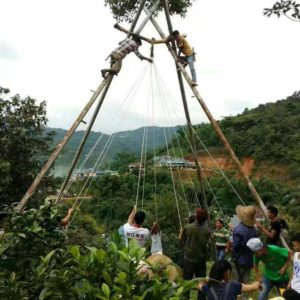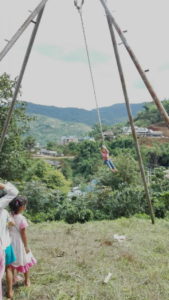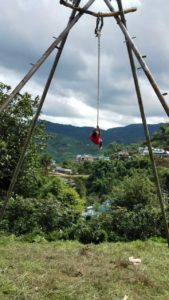According to the Lunar calendar, the full moon in late June or early July is the time Hani people celebrate Ye Ku Zha. The Chinese translation, 秋千节 means ‘Swing Festival’ because, similar to some other local minorities, a large swing forms a central part of the festival. In other parts of Yunnan the festival is also referred to as Zha Zha Festival and rather than a swing they may have a see-saw type arrangement where a horizontal pole, set atop a vertical pointed pole can both pivot vertically and rotate horizontally. There appear to be various founding legends for this festival, but it essentially celebrates ancestors, though in some areas it is said to also be a harvest festival.
Not all Hani people in Xishuangbanna celebrate it, but on Nan Nuo Shan and other Hani villages nearby they do. The time it is celebrated can also vary by as much as a couple of weeks. Traditionally the swing is made from four tall tree trunks, but due to the scarcity of the right height and thickness of trees, and restrictions on felling, it is common for the frame to be made of steel as it is in these photographs. The cross-pole is made from a thick length of vine and traditionally a number of thinner vines were strung over the cross-pole and braided to form the rope for the swing. Nowadays nylon rope is braided in the same manner.
After the festival, which lasts about one week, the rope is left on the frame to be taken down and replaced with a new one the next year. The swing cannot be ridden before the first day of the festival when a cow is slaughtered and the meat shared out between the villagers. At that point villagers and visitors can ride on the swing and there may be a competition to see who can swing the highest, but according to village lore, the main purpose of the swing is essentially a form of cleansing ritual: by riding on the swing one can cast off ‘bad luck’ or inauspicious events from the previous year.
At this time of the year, some way into the rainy season, tea farmers are not particularly busy. There may still be a little Summer tea being made in some villages where they have small tea trees, but generally there will be little tea until the Autumn and any crops that villagers may have planted, like rice or maize will have already been harvested or will not get harvested till the Autumn.



